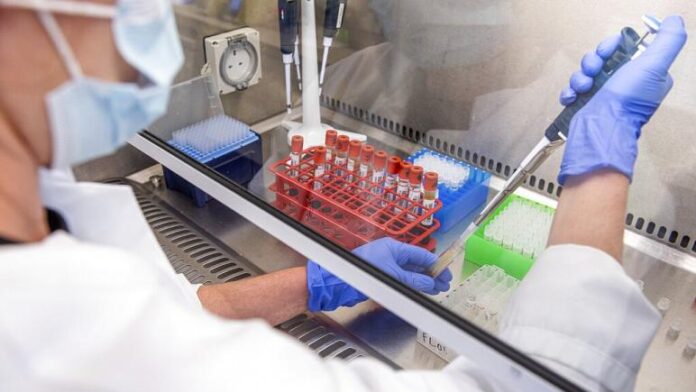Scientists at the University of Oxford say their experimental coronavirus vaccine has been shown in an early trial to prompt a protective immune response in hundreds of people who got the shot.
British researchers first began testing the vaccine in April in about 1,000 people, half of whom got the experimental vaccine.
Such early trials are usually designed only to evaluate safety but in this case, experts were also looking to see what kind of immune response was provoked.
In peer-reviewed research published on Monday in the medical journal the Lancet, scientists said that they found their experimental COVID-19 vaccine produced a dual immune response in people aged 18 to 55.
“We are seeing good immune response in almost everybody,” said Dr Adrian Hill, director of the Jenner Institute at Oxford University. “What this vaccine does particularly well is trigger both arms of the immune system,” he said.
Hill said that neutralising antibodies are produced — molecules which are key to blocking infection. In addition, the vaccine also causes a reaction in the body’s T-cells which help to fight off the coronavirus.
He said that larger trials evaluating the vaccine’s effectiveness, involving about 10,000 people in the UK, as well as participants in South Africa and Brazil, are still underway. Another big trial is slated to start in the US soon, aiming to enroll about 30,000 people.
Dr Hill said the vaccine seemed to produce a comparable level of antibodies to those produced by people who recovered from a COVID-19 infection and hoped that the T-cell response would provide extra protection.
“There’s increasing evidence that having a T-cell response as well as antibodies could be very important in controlling COVID-19,” Hill said. He suggested the immune response might be boosted after a second dose; their trial tested two doses administered about four weeks apart.
Hill said Oxford’s vaccine is designed to reduce disease and transmission. It uses a harmless virus — a chimpanzee cold virus, engineered so it can’t spread — to carry the coronavirus’ spike protein into the body, which should trigger an immune system response.
Hill said Oxford has partnered with drugmaker AstraZeneca to produce their vaccine globally, and that the company has already committed to making 2 billion doses.
“Even 2 billion doses may not be enough,” he said, underlining the importance of having multiple shots to combat the coronavirus.
“There was a hope that if we had a vaccine quickly enough, we could put out the pandemic,” Hill said, noting the continuing surge of infections globally. “I think it’s going to be very difficult to control this pandemic without a vaccine.”
Speaking at a World Health Organization (WHO) briefing on Monday, Dr Michael Ryan of the WHO’s Health Emergencies Programme said: “I think it is good news. Effectively we have 23 COVID-19 candidate vaccines in clinical development. As of today, we have just one candidate vaccine where phase one data is available in peer-reviewed journals.
“The data is very new. We welcome the study and congratulate our colleagues at the Oxford University’s Jenner Institute, the Oxford vaccine group, and obviously our colleagues at AstraZeneca for getting this data out there.”
He added: “There is a long way to go. These are phase one studies. We now need to move into larger scale, real-life trials but it is good to see more data, more products moving into this very important phase of vaccine discovery, and we congratulate our colleagues for the progress they have made.”
Numerous countries including Germany, France, the Netherlands, Italy, the US and the UK have all signed deals to receive hundreds of millions of doses of the vaccine — which has not yet been licensed — with the first deliveries scheduled for the autumn. British politicians have promised that if the shot proves effective, Britons will be the first to get it.
About a dozen different experimental vaccines are in early stages of human testing or poised to start, mostly in China, the US and Europe, with dozens more in earlier stages of development.
Dr Ibrahima Socé Fall, the Assistant Director-General of the WHO Emergency Response, stressed that while vaccine research successes were important, there was a lot of work the global community can do now to get the coronavirus pandemic under control.
“No tool, no instrument can ever replace people. People are the most important weapon we have to fight epidemics,” he said.
“Vaccines and drugs, medicines, are also public health tools… we just can’t wait around until a vaccine turns up to save lives. We need to start saving lives right now with the tools that we have. That’s what we’re doing and that’s what we’re continuing to do.
“Of course, research into treatment, therapies and vaccines is very important, but there are things we can do. We have many examples of dangerous pathogens that been brought under control even before a vaccine appeared for them.”
Giving the examples of Ebola, West Nile Fever and SARS, he said, testing, isolation, contact tracing and hygiene were all essential to combat the pandemic.
British officials said on Monday they had also signed a deal to buy 90 million doses of experimental COVID-19 vaccines being developed by the pharmaceutical giant Pfizer and others.
EURO NEWS

